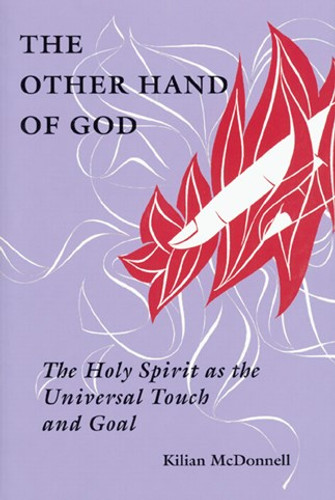If the Spirit is not equal to the Father and the Son, can the Trinity survive? Is the role of the Spirit in salvation as important as that of the Son? Why was the divinity of the Spirit problematic in the early Church? If the Son, Jesus Christ, is "the way the truth and the life," what role does the Spirit have in God's reaching out to touch the Church and the world? Is there any contact with, any experience of God, apart from the Spirit? In what sense is the Spirit the goal of the Christian life? The Other Hand of God addresses these theological queries.
| Format: | Paperback book |
|---|---|
| Product code: | LP5171 |
| Dimensions: | 6" x 9" |
| Length: | 288 pages |
| Publisher: |
Liturgical Press
|
| ISBN: | 9780814651711 |
| 1-2 copies | $21.95 each |
|---|---|
| 3-9 copies | $20.95 each |
| 10-49 copies | $19.96 each |
| 50-99 copies | $19.46 each |
| 100+ copies | $18.71 each |
Praise
This is a good book, and a delight to read; one of the best you could read on the Spirit. Its author is an elderly theologian, a monk and priest of St. John's Abbey, Collegeville, a great ecumenist, a gifted writer and clearly a deeply spiritual man. He has a fine gift for language, and he wears his scholarship lightly. This is a book that deserves wide reading and deep pondering.
Chapter by chapter, insight by insight, the word `magisterial' easily comes to mind. The book is a worthy capstone to a lifetime of distinguished scholarship, and it is must reading for anyone interested in a theology of the Holy Spirit.
McDonnell has provided a helpful overview of the formation of the Christian doctrinal tradition concerning the Holy Spirit and has indicated a number of important implications and corollaries of this tradition for future theologizing.
McDonnell's book covers a lot of territory and is difficult to summarize. He has synthesized the best work of the Trinity and on pneumatology done over the past quarter century. Although McDonnell is a systematic theologian, he is conversant with the work of New Testament exegetes, the patristic tradition, medieval monasticism, and contemporary studies on the Trinity by Congar, David Coffey, Catherine LaCugna, Walter Kasper, P. Florensky, H. Muehlen, John Zizioulas, and others. Some sections of this book simply took my breath away because of the authors profound knowledge of the theological tradition wedded to his language, which at times melts into poetry. It is difficult for me to recommend this book too highly.
It is . . . a wonderful snapshot of how to do theology (and pneumatology) in a postmodern and postfundationalistic world.
This carefully researched and beautifully written volume is the chef d'oeuvre of one of the most distinguished monastic scholars in our time. For McDonnell to do pneumatology is to do Trinity. His study of the Spirit, therefore, is not only a much-needed exercise in pneumatology; it also provides a comprehensive view of Christ, church, Trinity and eschatology. Long-awaited and heartily welcomed, The Other Hand of God will find its place anywhere the core of Christian faith is taken seriously.
. . . it is a work of serious scholarship, whose deceptively light style belies the weight of research and analysis it represents. It would make a fine contribution to any class on pneumatology or spirituality at an undergraduate or graduate level.
McDonnell is especially illuminating in his treatment of early Christian and patristic sources, and is a sure guide to key puzzlements about the mission and identity of the One concerning whom Hilary of Poitiers said, We should neither be silent nor should we speak.'
. . . an interesting and informative book that identifies and lifts up the role of the Holy Spirit in the economy of salvation . . . useful for seminary courses in pneumatology, and for graduate students and scholars working in this field.
Author
Kilian McDonnell, OSB, STD, a monk and priest of St. John's Abbey, Collegeville, Minnesota, is the founder and the president of the Institute for Ecumenical and Cultural Research in Collegeville. For years he was a consultor to the Pontifical Council for Unity in Rome. He has been involved both nationally and internationally in dialogues with the Lutherans, Presbyterians, Pentecostals, and Disciples of Christ. He has published on John Calvin, Christian initiation, and on the baptism of Jesus in the Jordan, as well as collections of poetry. The Catholic Theological Society of America has honored him for his contributions to theology.








